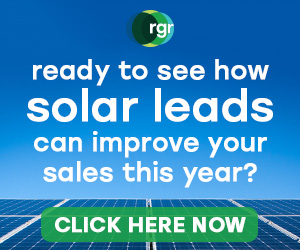
Are Your Defining Your Target Audience, Solar Installers?
 Marketing plays a crucial role in connecting solar installers with potential customers, but a common pitfall many solar companies fall into is attempting to appeal to everyone. This often leads to diluted messages and missed opportunities. By clearly defining and understanding target audiences, solar installers can craft more effective marketing strategies that resonate with potential clients, drive higher engagement, and ultimately boost conversions.
Marketing plays a crucial role in connecting solar installers with potential customers, but a common pitfall many solar companies fall into is attempting to appeal to everyone. This often leads to diluted messages and missed opportunities. By clearly defining and understanding target audiences, solar installers can craft more effective marketing strategies that resonate with potential clients, drive higher engagement, and ultimately boost conversions.
Here’s how solar installers can refine their marketing by honing in on their target audience.
Understanding the Importance of Target Audience
Defining a target audience allows solar installers to focus their marketing efforts on a specific group of individuals or businesses that are most likely to be interested in their services. This precision ensures that marketing resources are used efficiently, messages are more relevant, and campaigns yield better results. Having a well-defined target audience is essential in solar sales because it helps in:
- Creating Personalized Campaigns: Tailoring messages to address the specific needs, concerns, and interests of a defined group increases the likelihood of engagement and conversion.
- Optimizing Marketing Spend: Allocating budget to channels and strategies that reach the right audience reduces waste and improves return on investment (ROI).
- Enhancing Customer Relationships: Understanding the target audience allows for better customer service and relationship management, leading to higher satisfaction and loyalty.
Steps to Define Your Target Audience
- Analyze Existing Customer Base: Start by examining your current customers. Identify common characteristics such as demographics (age, gender, income, education level), geographic location, and psychographics (lifestyle, values, interests). This analysis provides insights into who is already buying your services and why.
- Research the Market: Conduct market research to identify broader trends and patterns in the solar industry. Understand the general demographics of solar adopters, typical buying behavior, and common pain points or motivations driving their decision to go solar, such as a desire to reduce their energy bills or increase their home’s sustainability.
- Segment the Market: Divide the larger market into smaller segments based on specific criteria such as residential vs. commercial clients, urban vs. rural locations, or environmentally conscious consumers vs. cost-saving seekers. This segmentation helps in creating more focused marketing strategies.
- Create Buyer Personas: Develop detailed buyer personas representing your ideal customers. Each persona should include demographic information, goals, challenges, purchasing behavior, and preferred communication channels. For instance, one persona might be "Eco-Friendly Emily," a middle-aged homeowner passionate about sustainability, while another could be "Cost-Cutting Carl," a business owner looking to reduce energy expenses.
- Evaluate Competitors: Study your competitors’ target audiences and marketing strategies. Understanding whom they are targeting and how can provide valuable insights and help you identify underserved segments or opportunities for differentiation.
- Continuously Refine: Defining your target audience is an ongoing process. As you gather more data and feedback, you may need to adjust your personas to better reflect your ideal customer.
Tailoring Your Marketing Strategies to Your Target Audience
Once you have your target audience defined, the next step is to tailor your marketing strategies to meet their specific needs and preferences. Here are some of the most effective techniques used in solar marketing:
- Content Marketing: Create content that addresses the interests and concerns of your target audience. For example, blog posts, videos, and social media updates can educate "Eco-Friendly Emily" about the environmental benefits of solar power, while case studies and ROI analyses can appeal to "Cost-Cutting Carl."
- SEO and Online Advertising: Use keywords and phrases that your target audience is likely to search for. For instance, focusing on terms like "solar panels for businesses" or "residential solar savings" can help attract the right visitors to your website. Additionally, online ads can be tailored to target specific demographics and geographic areas.
- Email Marketing: Segment your email lists based on your audience’s defined personas and send personalized messages that resonate with each group. Educational content, special offers, and updates relevant to their specific interests and needs can improve engagement.
- Social Media Engagement: Choose social media platforms that your target audience frequents. Share relevant content, engage in discussions, and run targeted ads to reach and interact with potential customers more effectively through the platforms they use most.
- Local Marketing: If your target audience is concentrated in specific geographic areas, consider local marketing strategies such as sponsoring community events, participating in local fairs, or collaborating with other local businesses to raise awareness and build trust within the community.
Measuring and Refining Your Strategy
Continually measure the effectiveness of your marketing efforts using analytics tools and customer feedback. Track key metrics such as website traffic, lead generation, conversion rates, and customer satisfaction. You can use this data to refine your target audience definitions and marketing strategies over time.
By investing the effort to define and understand your target audience, solar installers can create more impactful marketing campaigns that not only attract but also convert potential customers. This focused approach ensures that every marketing dollar spent contributes to building a sustainable, thriving business in the competitive solar industry.
Insider’s Tip: Purchasing Solar Leads Can Boost Sales In Less Time
Purchasing solar leads is an effective way to position your sales team for greater successes. The reason is because when you purchase your leads from a lead generation firm like RGR Marketing, the leads you receive are considered “hot.” This means that they have already done a lot of research into solar and have shown recent interest in purchasing it. As a result, your sales team can convert these leads quicker and easier than if they were using “cold” leads.
At RGR Marketing, we also take an extra step and scrub and verify your leads. We do this to help ensure that your lists are free of time and resource wasting frustrations, like duplicate leads, incorrect contact information, and incomplete data.
Partnering with RGR Marketing gives you access to solar leads that are high quality, highly targeted, and close to making their solar buying decision. Contact us today and start working with better leads that can help make your business more successful!
Start making more
money today!
Search Categories
Tags
Tag Cloud
Latest from Twitter
Contact Us
Call us at 310-540-8900 or fill out the form below and we’ll tell you how you can get high quality leads for free*.
* Get up to 10% free leads on your first order!